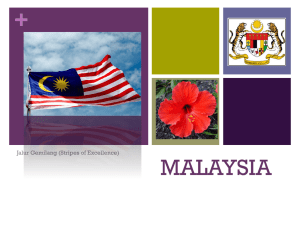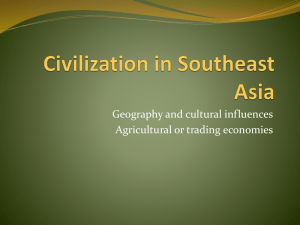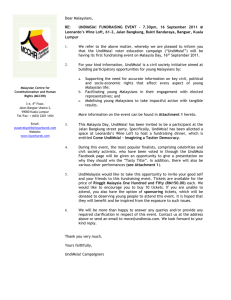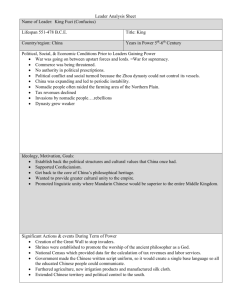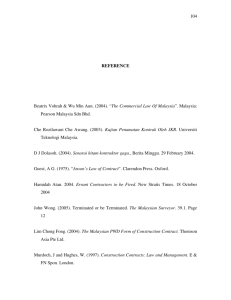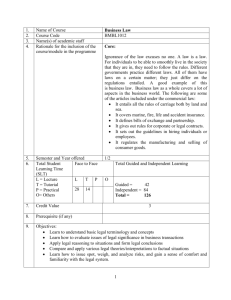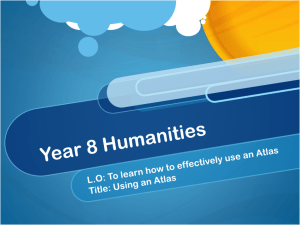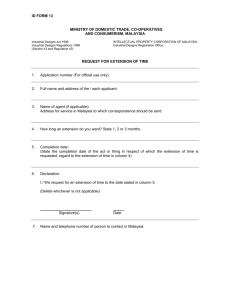bbdo voices - Campaign Brief
advertisement
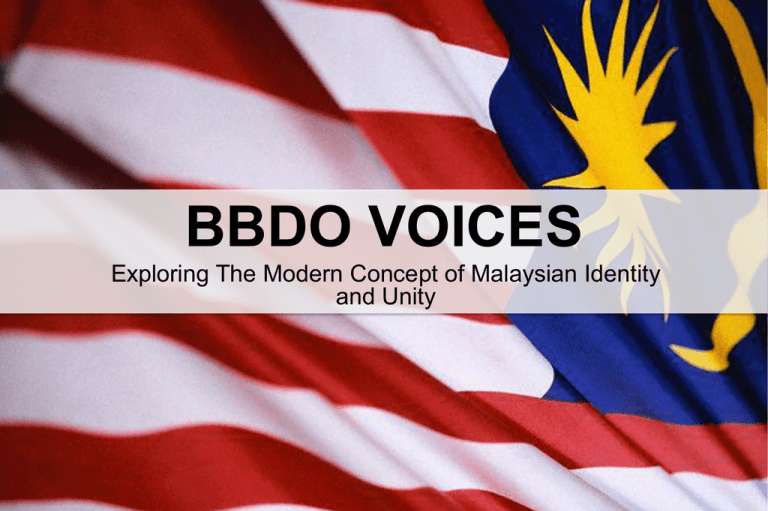
BBDO VOICES Exploring The Modern Concept of Malaysian Identity and Unity The anomaly Truly Asia. 1Malaysia. We all know that the beauty of Malaysia and what makes it unique is it’s long established multiracial and multicultural heritage. However is this where story ends? Whilst other nations have established (and stereotypical) national traits that their people are said to uphold regardless of race (E.g, USA’s optimism and confidence: The American Dream, Singapore’s ‘kiasu-ness’ and 1st class ambition etc.), Malaysia is more known for the fact that it is simply multicultural but not so much for the traits that bind them (other than an inherent love for food!). Whilst brands try to traverse the differences with various vernacular translations etc. and while the Government attempts to build a sense of togetherness, we dig a little deeper into the concept of race and identity in Malaysia to see what’s beyond the surface and if and how businesses can be part of the cultural narrative… What does it mean to be a Malaysian? A melting pot of distinct races, each with their own distinct cultures, what is it that binds Malaysians? What common ethic or philosophy do they subscribe to? In this edition of BBDO Voices, we explore the concept of the common Malaysian identity. Is there one? What is it? Is it positive or negative? How will it impact the nation and how can or should businesses be part of the narrative? A culmination of an extensive survey and subsequent group discussions and interviews with Malaysians from all walks of life, the following are our findings… Are Malaysians united? Is unity what they want? Unity is the goal but not always the reality Many Malaysians believe that more unity amongst Malaysians is the way to go and will assert a sense of unity and respect for fellow Malaysians, however it is clear that walking the talk is harder than it seems. Most but not all believe Malaysia is united A significant number of Chinese (30%) and Malays (15%) interviewed for this research, do not believe that the nation is united. Whilst the majority believe the nation is united, there is some work needed to create widespread confidence. Majority of Malaysians and their parents agree that Malaysia is united, this belief is relatively weaker among younger group and Chinese race • Generational differences in perception of Malaysian unity Half of Malaysian youth is not influenced by their parents’ opinion on Malaysia unity. And this group split into half for the belief vs. non-belief of an united Malaysia My parents believe Malaysia is united and I agree with them I am not aware of how my parents think but I think Malaysia is as united as it can be My parents believe Malaysia is united but I disagree with them 50% 41% 55% 52% 65% 44% Low base 29% 23% 18% 3% 1% 3% 4% 1% 24% 28% 19% 26% 31% Total 18-24 25-30 31-35 Chinese D1. Which of the following statements best describes your and your parents’ perception of Malaysian unity? Total Respondents (206), Chinese/Malay/Indian (98/93/9), 18-24/25-30/31-35 (68/88/50), *low base 33% 32% 24% I am not aware of how my parents think but I think Malaysia is not as united as it can be Q#: Base 37% 16% 4% 15% 11% Malay Indian 11% Lower income groups prioritise religion over nationality when it comes to identity Nationality is the most binding of traits regardless of race or religion, however lower income groups opt for the more divisive factor of religion as more important when it comes to identity. 2/3 of Malaysians describe their identity using nationality. However, Malays are more likely to think of their identity in terms of religion and Chinese in terms of race. • Personal identity in Malaysia Total Nationality 67% Race 17% Religion 14% Total Nationality Q#: Base 67% Race 17% Religion 14% Male Female -2 Chinese 1 0 5 -3 1 Below 51,600RM 2 -6 1 -2 6 -3 -8 -7 1 5 1 2 31-35 -1 5 1 -4 14 -3 Low -11 base 9 Single Married without kids -5 -3 -14 Married with kids 6 5 -2 Kuching -4 -1 -14 25-30 Klang -1 5 Low base 14 18-24 Kuala Lumpur 11 -12 Above 51,600RM Indian -4 7 -2 Malay -10 16 -6 base Low 6 -8 B1. Which of the following do you think best describes your identity in Malaysia? Total Respondents (206), Male/Female (83/123), Chinese/Malay/Indian (98/93/9) (Kuala Lumpur/Klang/Kuching (155/35/16) , Less than 51,600RM/above 51,600RM (59/147) , 18-24/25-30/3135 (68/88/50), Single/Married without kids/Married with kids (130/55/18) *low base A little more reserved at ‘marrying age’ Interestingly, Malaysians are very open to making friends outside their own racial groups, however this sentiment dips considerably between the ages of 25 to 30 years old. A majority of Malaysians are open to making friends outside their racial group, in particular the youngest, oldest and female respondents • Influence of race on friendship _ Do they make friends outside of their racial group? Very likely 39% 33% 43% 34% Somewhat likely Neutral Somewhat unlikely Very unlikely 29% 29% 28% 29% 22% 26% 28% 25% 26% 31% -3% 2% Total Q#: Base 40% 44% Male Female C2. How likely are you to make friends outside of your racial group? Total Respondents (206), Chinese/Malay/Indian (98/93/9) , 18-24/25-30/31-35 (68/88/50) 40% 18% 2% 35% 35% 29% 32% 30% 26% *low base 25-30 Low base 11% 0% 11% 5% 1% 8% 6% 18-24 78% 31-35 Chinese Malay Indian Racial stereotyping still exists Most but less than 50% believe that all races pursue all types of professions. Finance and business is largely pegged to Chinese, Medicine and Law to Indians and Social sciences to Malays. The perception of ambition for profession are different by race. Every race is associated with specific professions • Perception of race on profession in Malaysia Only 1 in 5 audience think that “Everyone Pursues These Professions Regardless of Their Races” for all professions Malays pursue this profession more than other races Indians pursue this profession more than other races Chinese pursue this profession more than other races Everyone in Malaysia pursues this profession regardless of their races 6% 19% 21% 49% Don't know 5% Chinese is strongly associated with finance and entrepreneurship professions while Indian with Medicine and Law, Malays with Architecture and social sciences 8% 9% 37% 7% 13% 6% 17% 39% 58% Q#: Base 19% 49% 48% 7% 12% 7% Law 45% 40% 5% 6% Medicine 16% 3% 18% 14% Engineering Architecture C5b. In your opinion, which of the following statements best describe how people pursue these professions in Malaysia? Total Respondents (206) 3% 54% 34% 5% 14% Social sciences Finance Own business A little more trust in people of own race Only 1 in 4 claimed that race does not matter when it comes to receiving/giving recommendations. However, people from the same race trust their own rather than someone from a different race. Race does has a role in source of recommendations for products, only 1 in 4 claims that race does not matter • Same race product recommendation Top 2 Box Very likely 43% 46% 18% 19% 25% 27% Somewhat likely Neutral Unlikely, race does not matter 16% 20% 41% 44% 10% 22% 48% 24% 31% 33% 12% 21% 22% 56% 34% 22% 34% 20% 35% 29% Believe Not Malaysia believe is united Malaysia is united 35% 39% 24% 18% 18-24 25-30 D3. How likely is it that you will buy a product based on the recommendation of a person of your race? Total Respondents (206), Believe/Nonbeliever (151/55, Chinese/Malay/Indian (98/93/9), 18-24/25-30/31-35 (68/88/50) 24% 40% 11% 29% Low 44% base 31% 11% 28% 27% 31-35 Chinese *low base 55% 27% 24% Total Q#: Base 36% 13% 33% Malay Indian Not only rose tinted view Unity communications are largely appreciated from brands and the Government, however for those who do not believe Malaysia is united, a more realistic and pragmatic approach to unity is appreciated. Does Malaysia have a common identity? What potential common threads are there? Acceptance of little commonality, perhaps is the commonality Common threads are hard to come by, however acceptance of this fact with the resilience to carry on is perhaps the uniting factor. Singular Malaysian Identity does not exist Perhaps it’s time to acknowledge that a Malaysian identity is a mish mash of diverse races and that’s not a bad thing. Initial frustrations With common threads hard to find except a multiracial environment, Malaysians are quick to voice less desirable common traits: Lazy; whiners; inefficient etc. Leads to strength in resilience However initial frustration leads to the realisation that Malaysians are a hardy bunch with attributes of tolerance, resilience and ‘boleh-ness’ – The will to just get on with things, even if there are challenges… ‘Tolerant’ Most respondents agree that Malaysians are overall tolerant of misgivings from wherever/whomever. A sense that whilst they may not understand or agree, they will find a way to get on. ‘Empathetic’ A sense of comfort within their own cultures, able to express themselves culturally freely. Whilst many agree that situations can be improved, many also concede that things could be a lot worse Together, for themselves Interestingly, all Malaysians agree on two things. Support for national sports champions and food! As long as the fruits of unity benefit them personally, Malaysians are more inclined to it. Lee Chong Wei and Nicol David are highly regarded by all kinds of Malaysians, as they are the only choice of worldclass sports champions that Malaysians can lay claim to. Likewise, food from different racial backgrounds are revered as they benefit individual stomachs! Sports heroes have appeal across races, but entertainment media celebrity preferences tend to be divided along racial lines • Celebrity preference ranking by race Chinese Rank 1 Lee Chong Wei Nicol David Owen Yap Rank 2 51% 12% Malay Rank 3 19% 38% 12% 82% 9% 59% Owen Yap Chinese Newsreader and Emcee Q#: Base Nicol David Awal Ashari Rank 2 38% 14% 18% 23% Rank 3 13% 69% 13% 50% 12% 12% 17% 41% 18% 11% 9% 38% Maya Karin 10%10% 11% 31% 8% 6% 9% 23% JinnyBoy Chinese Radio DJ and YouTube star Lee Chong Wei Neelofa 11% 6% 12% 29% Jinny Boy 5%6% 10% 21% JJ & Ean Rank 1 JJ & Ean English-language Radio DJs Lee Chong Wei Chinese Badminton World no. 1 D5b. Please rank them by dragging and dropping them into order of preference Total Respondents (206), Chinese/Malay/Indian (98/93/9) *low base Nicol David Indian-Chinese Squash World no. 1 Neelofa Malay Actress and model Awal Ashari Malay Actor and model Maya Karin Malay Actress and singer Chinese are more likely to see Malaysian food as a mix of racial influences, while lower income Malays tend to see Malaysian food as being best represented by Malay food. • Race and food Total A mix of all of the above 78% Malay 17% Chinese 6% Indian Q#: Base 3 4% A mix of all of the above 17% Chinese 6% 4% Chinese -2 8 4 1 0 0 0 Below 51,600RM 78% Malay Female -7 Total Indian Male Above 51,600RM Malay -9 -12 13 4 -3 -3 Indian -11 -6 Low base -6 0 18-24 25-30 4 -2 -3 12 -5 -1 -10 29 31-35 6 3 -3 1 3 -3 -1 0 3 -2 C6a. Which of the following best represents Malaysian food? Total Respondents (206), Male/Female (83/123), Chinese/Malay/Indian (98/93/9) , Less than 51,600RM/above 51,600RM (59/147), 18-24/25-30/31-35 (68/88/50) -7 2 -2 *low base What can this mean for business? The easy answer: Promote a uniting concept that benefits the individual The low-hanging fruit for brands to communicate on a national level is to leverage common assets that appeal across races because each race benefits. i.e. Sports and food can garner national appeal, however film and/or music are more subjective and may marginalise certain groups. Tackling unity: Sugar-coating is not as powerful as a revelation Whilst racial harmony communications are appreciated, they do not work as hard as those that deal with unity in its real form. A happy and rosy picture of harmony does not necessarily capture the resilience of Malaysians or progressive call to action. Less a melting pot, but a pot with very distinct parts; Different and distinct cultures living side by side with little assimilation between them is Malaysia’s unique point of difference. Better still, start a whole new conversation: Solidify and promote the common national sentiment of resilience and tolerance Brands can often help form the national cultural narrative. Nike’s ‘Just Do It’ is testament to the USA’s ‘Land of opportunity’ mentality. In Malaysia, brands not only have the opportunity to support a common national identity but actually help build, solidify and cement one. Malaysian Identity is a Work in Progress. Can you help build it?
